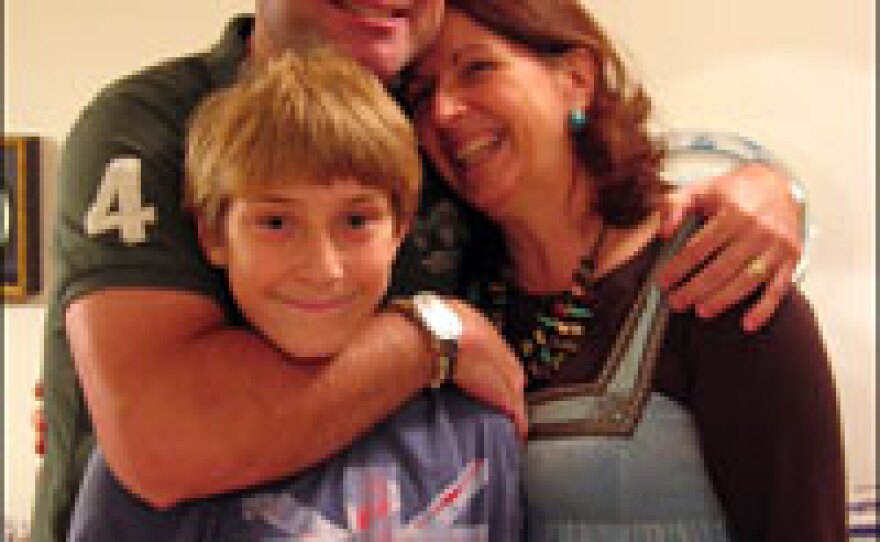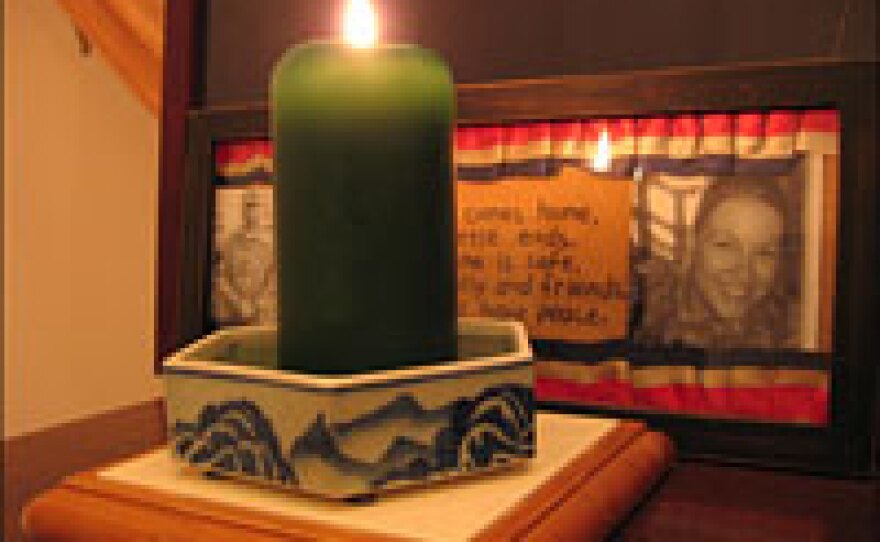

Chaplain Douglas Fenton is quite matter-of-fact as he tells the story of the severed foot.
He'd been deployed to Baquba, Iraq. Soldiers handed him a cardboard box containing the foot they had just found, a foot belonging to one of their buddies whose body had already been sent home. They didn't know what else to do with it. "They did the right thing," he says.
And he did the right thing. He took the box and sat with it on his lap on a helicopter flight as pilots fired flares to deflect potential heat-seeking missiles. That's the unimaginable, everyday horror of war.
It took its toll on Maj. Fenton. I first met him in May in Baquba, where he was chaplain for the 1st Cavalry Division's 3rd Brigade. I would go out on clearing operations with soldiers fighting insurgents who had been burying improvised explosive devices so deep in the ground that when they exploded, they could flip over armored vehicles. Exhausted and grief-stricken, the soldiers would come back to the base long enough for showers and too often, memorials, and then go out and fight all over again. As brigade chaplain, Fenton was the one who flew to see the wounded and dead. By the time he left last August, he had prayed over 88 dead soldiers.
I had promised to try to come and see him when I was back in Iraq. Before I could, he sent me a message from Germany saying he'd been flown out — diagnosed with post-traumatic stress disorder.
We tend to think of a chaplain's faith as his armor against the horrors of war. The same way we think the medical training of care providers is their shield. But those who are affected by post-traumatic stress disorder aren't just the soldiers in battle, they are the people taking care of those troops — the chaplains, the medics and even mental health professionals, military psychiatrists say.
Fenton hadn't wanted to leave — hadn't wanted to ask for help. To those who didn't know him well, the former JAG officer seemed fine. But his concentration was slipping: He had a hard time writing sermons or even reading. He withdrew; he couldn't reach out to the soldiers he was supposed to help. He was taking pills to help him sleep. And he would cry uncontrollably.
He had nightmares about the soldiers he buried.
"I used to think that people who died were peaceful. One gentleman drowned and looked peaceful — it's hard to find a peaceful face because the deaths there are so hard."
In the weeks before he was evacuated, he says, he felt he was losing his mind.
Fenton and his wife, Christine, sit down with producer Kate Davidson and me at their new home. Divorced parents who met when they served at Arlington National Cemetery, they now live down the street from Fenton's teenage son and daughter. While Fenton was in Baquba, Christine was working in mortuary affairs at Fort Hood, Texas — receiving the bodies her husband had prayed over.
"I felt relief, but I also felt shame. I still feel shame — we all do," Fenton says about being evacuated. He says a lot of it was the shame that all soldiers feel at leaving their buddies in danger, and part of it was that he was a caregiver and an officer — one of the people who was supposed to be taking care of others in an Army seriously short of chaplains.
Fenton is now an outpatient at Walter Reed Army Medical Center. He plans to eventually retire from the Army but use his ministry to help other PTSD sufferers.
Fenton and his family are relatively lucky: They have each other and a deep faith that things will turn out all right. But Fenton's son and daughter have been affected in ways he hadn't even realized. His son Connor, who's 13, seems at first like a typical, sweet, funny, irreverent teenager — until he reads us an essay he wrote recently at school about the death of a soldier in Iraq whom he considered a brother.
"I will never forget the image that enters my mind every day when I think of Bill," he reads. "The RPG racing toward his Hummer — he turns his head at the sound of the noise — the red trail following the RPG — then it hits me, then it's over — no one is alive."
Connor, sprawled on the sofa leaning against his dad, also speaks poignantly about how his father has changed.
"He's angrier. He gets angry quicker, which isn't his fault, of course. He cries a lot ... I sit by him, I hug him, I try to show him that I'm still here for him, no matter what happened to him, and even if he lost arms or legs, I'd still love him because he's my dad," he says.
He doesn't talk very much about his father at school: "You can't really talk to anyone who didn't experience it."
As well as trying to care for her husband, Christine worries about her own daughter — currently deployed in Iraq. But she doesn't show it in front of her husband.
"I have to be very, very careful. I have to think about the words I'm going to use. I have to think about the phrases. I have to think about my facial expressions. ... I've learned when things aren't good to smile and say 'I love you' and we go on. It doesn't matter — I could be in the worst of moods, but I smile still and just go on."
At Walter Reed, chief psychiatrist Col. John Bradley says the number of care providers affected by PTSD seems to mirror that of the general deployed population — between 10 percent and 17 percent.
"One person's trauma may not be another person's trauma. It could be something from being engaged in a firefight, which I think we would all agree is a potentially traumatic event, to witnessing death and destruction, dead bodies, injuries, things along those lines. Everyone has a different threshold for what they perceive as traumatic and how they deal with exposure to those traumatic events on a day-to-day basis," he says.
He shows us around Ward 53, the psychiatric outpatient unit, where a board lists daily activities such as art and group therapy.
For Fenton, one of the issues that continues to come up is the stigma he and other soldiers feel about being labeled mentally ill, rather than wounded in war. He resents being treated on the psychiatric ward with soldiers with other mental illnesses, such as schizophrenia and bipolar disorder, who have never been in combat.
"They need to find a better way for it not to be a stigma ... Who wants to have someone say you're mentally ill when you're 18? No one. That's what they're being told if they have to walk into a ward that's a psychiatry ward," he said.
Some psychiatrists agree. Dr. Jonathan Shay, a leading PTSD expert who teaches chaplains, has called for PTSD to be reclassified as an injury rather than a disorder.
"There is a second territory ... and that is secondary traumatic stress injury," says Shay, the author of Odysseus in America and Achilles in Vietnam. "If you have a steady diet of witnessing horrors or hearing narratives that are filled with horror and betrayal and violence and cruelty, then you can get injured by that, even if you are not being attacked or brutalized."
To avoid possible repercussions in their careers, he says, it's common for care providers, including chaplains and medics, to seek confidential psychiatric help outside the military system.
Fenton expects a long road ahead, but he and his family believe they are on that road.
"It's going to take time," Christine Fenton says. "I have faith that we will eventually get back to where we were."
Copyright 2022 NPR. To see more, visit https://www.npr.org. 9(MDAzMjM2NDYzMDEyMzc1Njk5NjAxNzY3OQ001))







